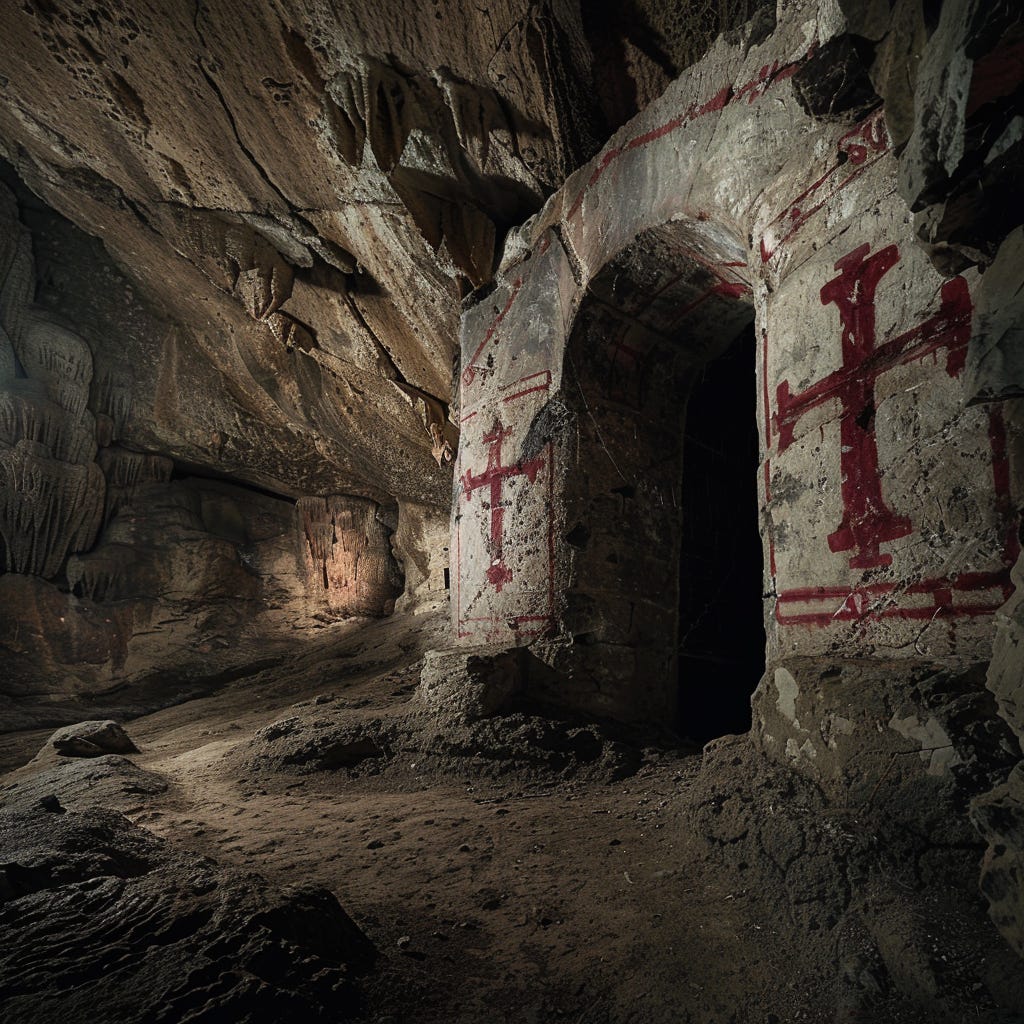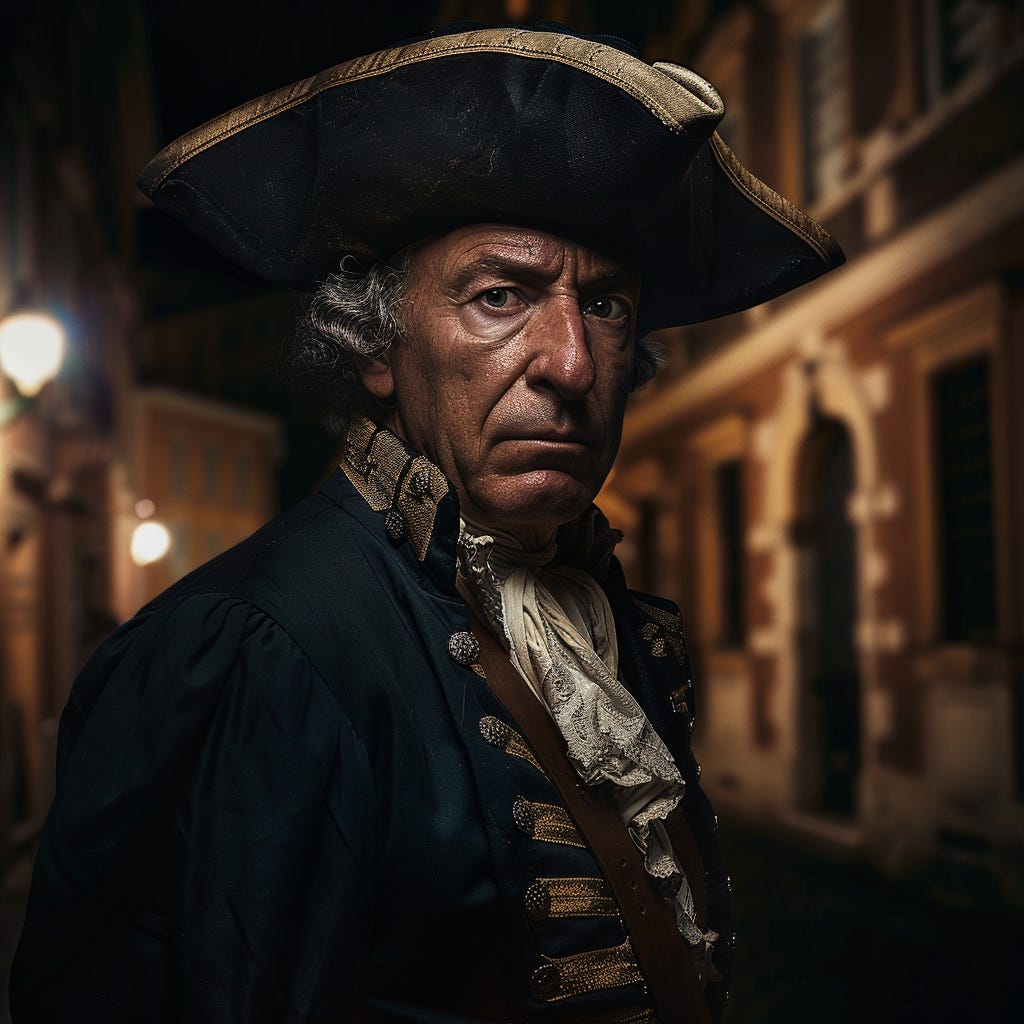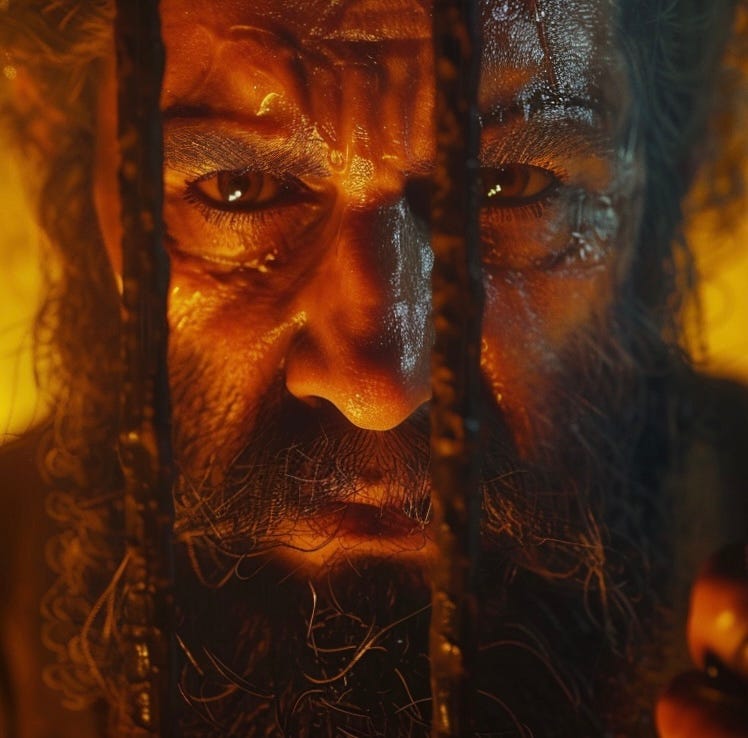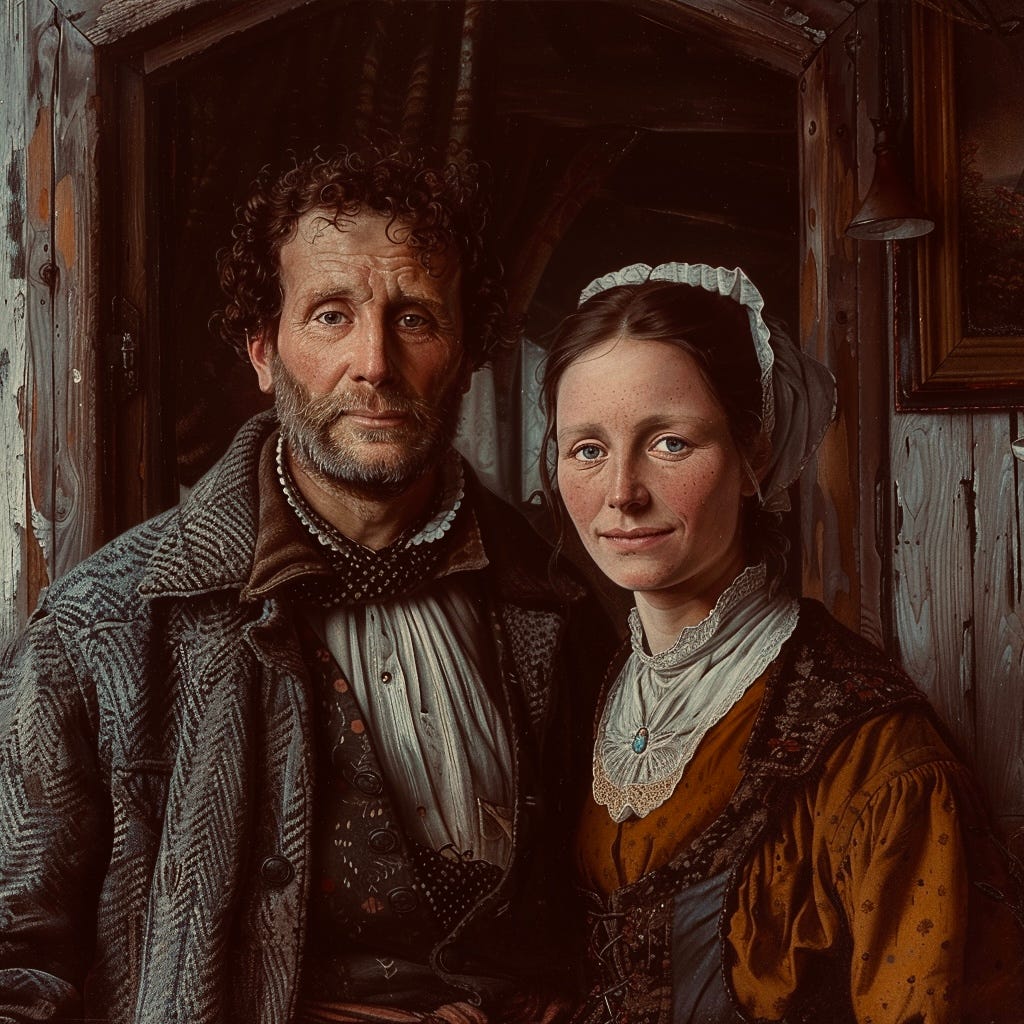The Werewolf of Mariahilf am Inn II.13
A Gothic Horror Novel
Book II, Chapter 13: Grace Abounding
List of Chapters | Previous Chapter
The position of the stars suggested it was between 3:00 and 4:00 a.m.—the Witching Hour. Hermann sat in the upstairs living room of the carriage house. The back of his chair was pushed against the edge of the table. He studied Walter, who slept on the rug with his purring tomcat whom he had named Mürrisch (Grumpy).
The orphan had evidently woken up in the night and crept (bedding in hand) out of his bunk room so he could sleep next to the potbelly stove, still warm to the touch. His pillow was wedged against one of the iron legs; the cat was curled up in a ball by his head.
Two days had passed since Hermann had learned the horrific story of his own “death in birth” and the unholy resurrection in the cradle that had followed. The villagers of Mariahilf am Inn had interpreted the event as a blessing. But if that had been the case, why had his father and grandmother never spoken of it to him? He had lived his life under the impression that through faith and prayer he might one day enter into the Holy City and (like Abraham) be accounted a friend of God. But now I learn I am not even human. I’m an undead thing. O Lord, my God, why have You turned Your face away from me?
By the wintry light filtering through the window panes, Hermann saw the one-eyed cat contemplating him. It had stopped purring. What had Benedikt called it? Oh, yes: a witch’s familiar spirit.
“Papa?” It was Walter. “Why are you sitting there like that?”
“Because, like you, I’m cold.”
The orphan stood up, drew his blanket tight around his shoulders, and padded over to him. Mürrisch crossed the room and leaped onto the tabletop. Walter sat on Hermann’s lap and rested his head lay on his chest.
“You’re supposed to keep the cat in your room.” Hermann whispered so as not to wake Benedikt and Monika, whose bedroom stood opposite the stove.
“I know,” Walter said. The cat arched its back. Hermann felt it rub its fur against the nape of his neck. Again, the boy drifted off to sleep.
Hermann turned over in his memory everything he had ever learned concerning divine justice and the grace of God. If it had been the will of the Almighty that he bear this monstrous curse, what gift—what benefit—could have possibly redounded upon the souls of his loved ones who had suffered and perished on his account? He had lost everything; but what had they gained?
He recalled the tale of the philosopher from Trieste—the cunning young man who (through lies and deceptions) had entered into Holy Orders and assumed the name of Fr. Matteo di Pàdova in order to exact revenge against his uncle, who had contrived to murder his family and his closest friend.
According to Benedikt, this false friar underwent a moral and spiritual conversion while serving as guardian over the werewolf of Mariahilf am Inn. It was as if the malevolency compacted in this fell beast had wrought a contrary effect on him. For does Paul not say, where sin abounded; grace did much more abound?
The morning after Benedikt and Hermann dined at the public house, the two of them headed into the forest to chop firewood from a tree that someone else (probably from the village) had illegally cut down for the same purpose. They split the wood into small logs and loaded these into a hand-drawn sled that they brought with them. During the summer months, the sled was kept tied up in the rafters of the carriage house.
Benedikt insisted that they take a breather once the logs had been loaded up and tied down. During this break, he reviewed the events of the story he had recounted to Hermann the previous night (since both of them had been drinking). Then he resumed his narrative:
“Fr. Matteo and I sat near the brink of that Waldensian hideout until the winds blew sharp and chill. The scrapes on my knees and shins were superficial. My master had expertly cleaned and treated the wounds. He had spared the gauze, telling me that it might be needed for something more serious. As he spoke, I could not help but look at the pads of his own bare feet, now sticky with gore from where he had damaged them in those harrowing leaps. I got up and walked with a slight limp through the cavernous chambers, which I had only now been able to explore.
“Now that the sun had crossed its meridian, the darksome cavities and recesses along the western slopes of the mountain were bathed in a pale aura that enhanced the romantic effect of the scene and discovered its raw and chthonian beauty. The walls were adorned with simple frescoes—crucifixes, saints, episodes from the Bible—all edged in the green, cobalt and yellow-ochre hues of a bygone era. However, the most prominent color—of which all the images partook—was a reddish-brown umber that Fr. Matteo explained was compounded of dye and the artists’ blood.
“‘Master,’ I said to him, ‘you told me of the tragedy that befell your family, and of the murder of your beloved friend, Samuel. You suspected your uncle to be the culprit; and so you journeyed to Rome. . . to confront him. Please, tell me what ensued. And how does it relate to the creature you found imprisoned in the catacombs of Santa Maria della Concezione dei Cappuccini, whom it was your duty to watch over?’
“Fr. Matteo leaned his back against a wall painted with a massive chalice that I presumed to represent either the Holy Grail or the Cup of Communion.
“‘I shared a monastic cell,’ he began, ‘with two capuchin lay brothers, my companions. We three were the ostiarii—the gatekeepers—for the man in the dungeon. But I had other responsibilities. After all, ora et labora (prayer and work) is a motto not exclusive to the Benedictines. A third of my day was devoted to standing on the streets of Rome, dressed only in a simple habit, no matter the harshness and inclemency of the weather. I distributed rosaries in exchange for donations, and was granted more or less free rein to choose where in the Eternal City I would execute this office. So I chose the precincts around the Palazzo Barberini, so that I could monitor the comings and goings of its residents.
“‘I had never met my uncle, but a char-woman who worked for him pointed him out to me. She indicated that, due to his inferior rank, he and his family lived in suites adjacent to (but apart from) the ducal quarters. He was well off enough to possess his own contingent of servants and retainers. And near the family’s private access stood a modest coach with a team of horses, always harnessed and at the ready.
“‘While working outside the church, I would scour the alleys and streets, looking for discarded objects of transparent glass—or clear glass fragments and shards—which I gathered up and brought with me into my monastic cell. I stored these items underneath my cot until the next day after Matins, when it was my time to retire into the catacombs to tend to the monster.
“‘Because Franciscans are not permitted to possess personal property, I would take the glass with me and place them in a concealed hole that I had dug beneath a mound of capuchin skulls. During the hours of my watch, when I should have been praying for the creature’s soul, I would ensure the tapers were lit, wrap my hands in burlap, shatter the glass and rubbed the fragments against a stone to pulverize them into shavings, which I then placed in an earthen jar I kept hidden in the same location.
“‘My uncle had slain my family in one night by the application of a subtle poison. I was determined to kill his over the course of many weeks, perhaps months. They would spit blood and seize their bellies in agony as their insides were slowly torn to ribbons. It was the custom at the time for lowly friars, such as myself, to bless the food of a household’s kitchen. I would insinuate myself into the good graces of the elderly cook, a devout Catholic, and offer to bless Signore Ludovico’s salt and flour. I would thrust fistfuls of powdered glass into the sacks and barrels as I mumbled doggerel Latin poems in lieu of prayers. Then, I would watch as one by one the bodies of my enemy and his offspring were borne from the palazzo in winding sheets.
“‘I did not doubt but that the Duke and his advisors would presume a horrid contagion had overtaken his brother’s household, and that the Barberinis would close ranks collectively and demand that my uncle and his family be either ejected from the palace, or that the apartments be placed under quarantine until the last of the household had perished.
“‘This was my plan. A plan that never came to fruition. . .’
“Fr. Matteo grew agitated. His eyes brimmed with tears. He gazed beyond me, at the ledge overlooking the alpine gorge. The sun’s rays had pierced the gray clouds and begun to purge away the mists of the morning. The old Franciscan touched his withered face, then examined the palms of his hands, as if he had become estranged from them.
“‘My uncle,’ he continued, ‘often passed by me. He would bow curtly out of respect for my office. But there was ever and always a profound sadness hanging on his brow.
“‘Then one night, as I stood alone in the piazza, his coach halted before me. A servant climbed down from the box and opened the door. When it the door shut again, I glimpsed his wife and older son, whose faces were contorted into haggard masks of despondency and shame. In her arms, my aunt held her infant son—my cousin!—whom she had pulled away from the glass so that the toddler would not see the sobbing wretch that staggered toward me.
“‘Ludovico di Barberini seized my hands. He begged me to hear his confession. I rejoined that had no power to shrive him. Disregarding this, he spoke in a voice full of candor and urgency, which took me aback. He claimed to have detected in my visage faint traces that recalled to his mind a brother, whom he had murdered with his entire family, save a nephew who had fled. The victims’ spirits now haunted him, night and day. He knew that he was destined for hellfire; and, as a matter of honor, suggested that, were he to take his own life, this would magnify the severity of his everlasting punishment in Hell, since a suicide was more hateful in the eyes of God than a murderer.
“‘I could not speak. It was as though the fabled basilisk had gazed upon me. I saw in the carriage window that the toddler had torn himself away from his mother’s arms and now stared at me, eyes desperate, lips quivering. He wanted me to say something that would bring the father he loved so dearly back to him.
“‘There has been much written concerning the mystery and nature of divine grace. All that I can say is that—at that moment—my hatred for this man, and my lust for revenge, melted away, as suddenly as a candle’s flame is blown out; and a fountain of ineffable compassion and boundless love sprang up in the vacancy that had been left behind.
“‘I looked askance at the night sky. I inquired of him (in a voice that seemed not my own) what was to become of his wife and children were he to compound the crimes he had already committed with an ever graver one, such as that which he now proposed. I said it were far better for him to return to his family, provide for them, and repent for his sins every morning and every night until his days on this earth were ended. I would pray for his soul, I said, and perhaps—through the intercession of the holy saints and Blessed Virgin—a place in the hereafter might be found for him on the slopes of Purgatory Mount.
“‘He fell to his knees and seized the hem of my habit. He thanked me and pressed into my hands a purse containing 50 scudi. He removed a golden rings he wore, and handed it to me as well. When I had returned to the church, I entered the abbot’s office. I cast these objects onto his desk. I told him they had been given as an offering. The abbot asked no questions. He summoned the deacon, and, in my presence, directed him to weigh the coins and place them and the ring in the treasury.
“‘I hardly slept that night, and when it was my turn the next morning to watch over the prisoner, I carried the bucket of slops containing his food down the steps into the catacombs. I was so tired, so drained, that, after having fed him, I fell asleep with my head resting against the rusty bars of his cell. I awoke some hours later to the man tenderly caressing my cheeks. He had freed himself of his bonds. For he had never needed these.
“‘I was not alarmed. I stared into his eyes; and he smiled upon me. Suddenly, this man, who had not spoken to another living soul in over thirty years, broke his silence and said in German that he knew why I had acted as I had. For by grace are ye saved. And that not of yourselves, for it is the gift of God. The candlelight reflected so vividly in his eyes that it was as though the orbs were infused with the unquenchable light of the divine godhead. What I could not have known at the time was that I was being seduced by the Devil.
“‘As I wept, he turned away. He said that he was ready to leave this world to stand in judgment before God in the next. He wished me to facilitate this journey, stressing that I was not being asked to commit murder, since he was already dead. Rather, I was to be his ferryman. But before the boat was pushed off this mortal shore, he wanted to tell me his story, so that I would pass it on to another, who would in turn pass it on to a little boy who was yet to be born.’”
Benedikt at this point concluded this part of the story.
“I can tell that you are overwhelmed. I shall continue the tale later. For now, let us return.”
Together, he and Hermann dragged the sled filled with logs through the thick December snow in the direction of the Eltzbacher Coach Inn.
—Hermann had fallen asleep with Walter in his arms. Though it was not yet sunrise, the eastern horizon had begun to pale. Hermann kissed the orphan’s brow and looked up. He blinked to accustom his eyes to the dimness of the living room.
Monika and Benedikt stood next to the potbelly stove, holding hands.
“How long have you been there?” Hermann inquired with a yawn.
“Not long,” Benedikt whispered.
Monika smiled. “There was something about the way the moonlight fell on your face. I’m not a religious person, but you looked almost. . .”
“Blessed,” Benedikt said.
“Yes. . .” Monika sighed. “I hope you will not take offense, Moritz, when I tell you that I envy you your son.” There was Sehnsucht in her voice, a word that can mean not only a sense of longing for that which is, but carries within it the implication of a nostalgia for something that might have been but never was.
Hermann could not help but to feel deeply gratified and uplifted by her remark.
Monika went back into her room to change into her work clothes.
Walter opened his eyes and stretched. “What time is it?”
Hermann helped the boy down. “Time to put that cat of yours back in your bunk room. It’s going to be a busy day.”
With his blanket over his shoulders, Walter folded Mürrisch into his arms and left the living room.











One of the best serializations on Substack.
Mr. O'Donnell is quite right Daniel! Thus you congure the visualizations that grab the reader and hold us entranced!